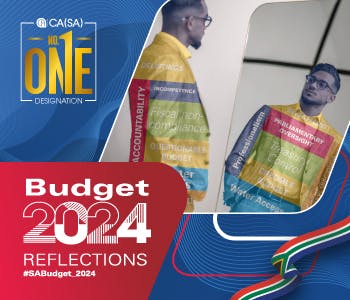The state of local government; so what’s the solution?
By: Muneer Hassan CA(SA), Member of SAICA’s National Tax Committee, Deputy HOD Accountancy & Senior Lecturer: Taxation at UJ; and Marcus Botha, a Director with BDO Tax Services (Pty) Ltd
Johannesburg, 19 February 2024 – The Auditor General’s (AG) annual report on the condition of local government is met every year with disbelief, gloom, and doom. The past year was no different. In the 2022/23 municipal audits conducted, the AGSA discovered 268 material irregularities with an estimated value of R5.19 billion. Procurement and payments, resource management, revenue management, interest and penalties, comprised the majority of these concerns.
The audit outcomes were previously in a bad state, and this state did not improve in 2021-22. Only 38 out of 257 municipalities received unqualified audit opinions with no audit findings (i.e. clean audits). This is not an impressive number at all. The AG had to intervene and had to use its enforcement mandate for the non-submission of financial statements by 15 municipalities by their due date.
Further reductions in municipal revenue have resulted from the implementation of solar energy allowances in the Income Tax Act. Consequently, the decreased dependence of taxpayers who previously paid their electricity bills to municipalities reduces municipal revenue. National Treasury should consider this impact.
The AG Tsakani Maluleke has previously called on local government leadership to build a culture of accountability with consequences that will improve service delivery and living conditions for citizens. She noted that, “local government has been characterised by dysfunctional municipalities, financial mismanagement, council and administrative instability, and crumbling municipal infrastructure. This leads to deteriorating standards of living and service delivery failures, resulting in service delivery protests. I firmly believe that service delivery improvements will be enabled by capable, accountable and citizen-centric municipal leadership delivering on their mandates to improve the lives of ordinary South Africans.”
In line with this call, the AG themed her latest general report, ‘A culture of accountability will improve service delivery’. She adds that, “inadequate maintenance, ineffective planning and poor execution of infrastructure projects over many years have not only affected government’s ability to deliver services to the public, but also have significant cost implications, placing further strain on both government finances and the environment. Investing in preventative controls to address the causes of infrastructure project failures is more effective than dealing with the consequences of such failures, which include lengthy delays, poor build quality, financial loss, and harm to the public and the environment.”
It is thus unsurprising that there has been a surge in protests regarding service delivery, given that everything boils down to these concerns.
What, then, is the solution? It is undisputed that we cannot continue with the historical static approach, doing the same thing in the hope that a different outcome will occur. The proposed solution is twofold and requires a private-public partnership.
First, utilise the power of Fourth Industrial Revolution (‘4IR’) technologies to establish transparent digital governance and financial control that instils a detective control environment with no manual override opportunity. This will result in the accountability and consequence management that the AG calls for. Continuous auditing by the AG will then become a reality using similar technologies. The National Prosecuting Authority (NPA) should explore a direct link to this proposed solution, but this is an involved discussion, and thus a topic for another day. The AG presented the audit results for the 2021/22 period in May 2023, almost a year later. Large quantities of structured or semi-structured data can be processed by 4IR technologies in real-time, displaying outlying areas for investigation at the touch of a button.
Second, we must bolster the critical skills necessary in the local and provincial spheres of government. The professional services industries and associated regulatory bodies could consider a public service year for accountants, lawyers and engineers, to name a few. These professionals should be deployed once qualified or at the end of their training contracts. Their expertise will facilitate change, deliver knowledge transfer and drive future eras of competent, well-managed municipalities. This translates into provincial and local service delivery that underpins economic activity and the ability of the private sector to do business.
It is too late for this budget cycle. Still, we expect that the dire state of our municipalities and workable solutions will be considered in the next cycle.
About SAICA
The South African Institute of Chartered Accountants (SAICA), South Africa’s pre-eminent accountancy body, is recognised as the world’s leading accounting institute and is home to the leading CA designation in the world The Institute provides a wide range of support services to more than 50 000 members and associates who are chartered accountants (CAs[SA]), as well as associate general accountants (AGAs[SA]) and accounting technicians (ATs[SA]), who hold positions as CEOs, MDs, board directors, business owners, chief financial officers, auditors and leaders in every sphere of commerce and industry, and who play a significant role in the nation’s highly dynamic business sector and economic development.
Chartered Accountants are highly valued for their versatile skill set and creative lateral thinking, that's why all of the top 100 Global Brands employ Chartered Accountants.
SAICA is a member of Chartered Accountants Worldwide (CAW), a global family that connects over 1,8 million fellow Chartered Accountants and students in more than 190 countries. Together, we support, develop, and promote the role of Chartered Accountants as trusted business leaders, difference-makers, and advisers.
SAICA Media Contacts
Kgauhelo Dioka, ***@saica.co.za
Project Manager: Communications
SAICA Brand Division
Renette Human, ***@saica.co.za
Project Director: Communications
SAICA Brand Division
